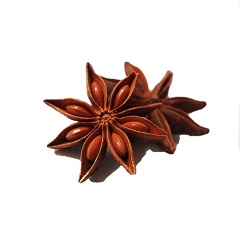
Medicine:
Use: Used for bronchitis, whooping cough, sore throat, colic, arthritis, upset stomach, stomach pain (gastritis), diarrhea, bed wetting, a movement disorder in children (dyspraxia), intestinal gas (flatulence), parasitic worm infections, and skin disorders
Illicium verum is a medium-sized evergreen tree native to northeast Vietnam and southwest China. A spice commonly called star anise, staranise, star anise seed, Chinese star anise, or badian that closely resembles anise in flavor is obtained from the star-shaped pericarps of the fruit of I. verum which are harvested just before ripening. Star anise oil is a highly fragrant oil used in cooking, perfumery, soaps, toothpastes, mouthwashes, and skin creams.
The star anise used as medicine is Chinese star anise. Don’t confuse it with Japanese star anise, which is poisonous and should not be taken. Star anise contains anethole, which is the same ingredient that gives the anise (Pimpinella anium) its distinctive licorice flavor. One cell line study suggested that anethole, a componet of star anise, may possess antimicrobial properties effective against bacteria, yeast and fungal strains.
People try taking star anise for respiratory tract infections, lung swelling (inflammation), cough, bronchitis, the flu (influenza), swine flu, and bird flu. They also use it for digestive tract problems including upset stomach, gas, loss of appetite, and colic in babies. Some women use star anise for increasing the flow of breast milk, promoting menstruation, and easing childbirth. Some people inhale star anise to treat respiratory tract congestion.
Star anise seeds contain ingredients that might have activity against bacteria, yeast, and fungi. People try star anise for treating flu because it is a good source of shikimic acid, which is used in the manufacture of oseltamivir (Tamiflu), a flu treatment. However, there isn't any research showing that star anise has any activity against viruses such as the flu virus.